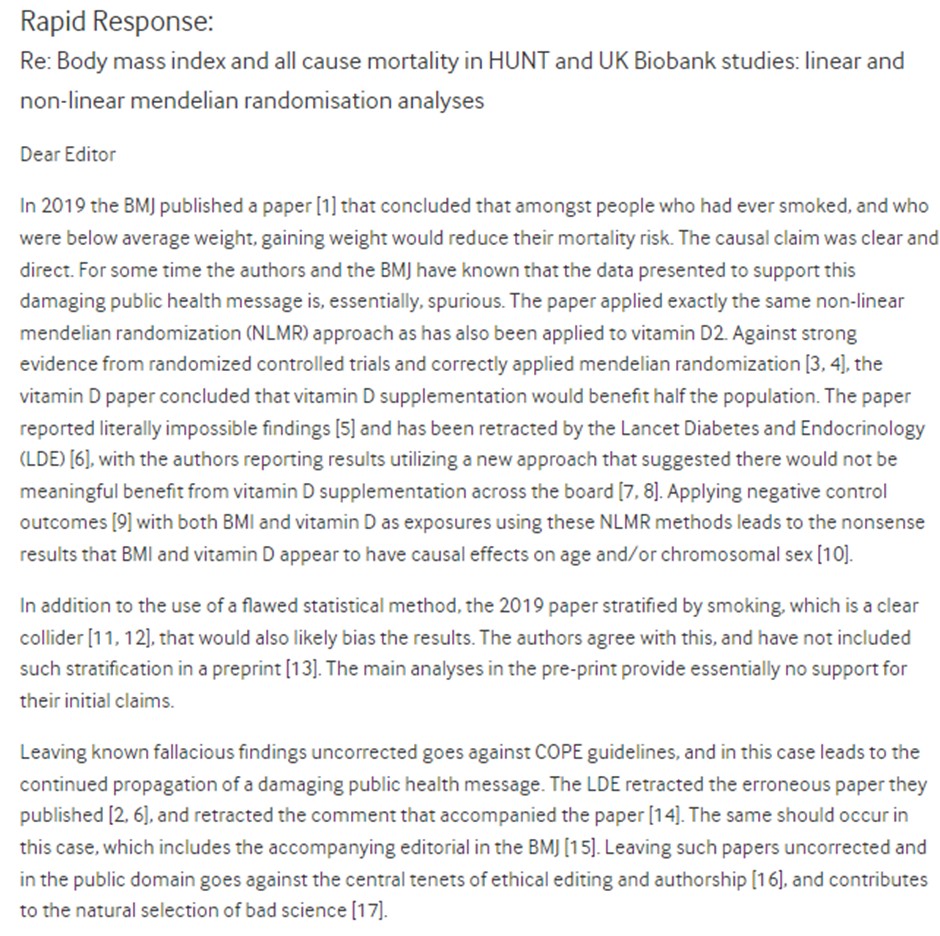
How to get URL link on X (Twitter) App



 2/n The sad story of NLMR and the delays in journals and authors in issuing retractions of clearly spurious papers containing damaging public health messages that include *literally impossible* findings is told here /cont
2/n The sad story of NLMR and the delays in journals and authors in issuing retractions of clearly spurious papers containing damaging public health messages that include *literally impossible* findings is told here /conthttps://x.com/mendel_random/status/1730639091690336427



 1/n The academic paper @guardain story is based on suggests that growing tea consumption by the working class after 1784 in Britain led to a fall in mortality. It uses what it calls "The Tea and Windows Act of 1784" which led to a dramatic fall /cont repec.iza.org/dp15016.pdf
1/n The academic paper @guardain story is based on suggests that growing tea consumption by the working class after 1784 in Britain led to a fall in mortality. It uses what it calls "The Tea and Windows Act of 1784" which led to a dramatic fall /cont repec.iza.org/dp15016.pdf

 2/n Naïve observational studies report J- or U- shaped upturns of mortality at lower levels of BMI. Our paper using UK Biobank (UKB; @uk_biobank) data suggested overall adverse effects of BMI on mortality, and (though very imprecisely estimated) the NLMR suggested a lower /cont
2/n Naïve observational studies report J- or U- shaped upturns of mortality at lower levels of BMI. Our paper using UK Biobank (UKB; @uk_biobank) data suggested overall adverse effects of BMI on mortality, and (though very imprecisely estimated) the NLMR suggested a lower /cont


https://twitter.com/mendel_random/status/1458360073428914179?s=20&t=HMORYc_WvCLxXBsVUZOf9A



 1/n The pattern could be a chance quirk, or could reflect testing regimens being related to previous severity of the epidemic, or safer behavioural patterns in areas badly affected, or more homeworking being possible in such places (or a mix of the above)
1/n The pattern could be a chance quirk, or could reflect testing regimens being related to previous severity of the epidemic, or safer behavioural patterns in areas badly affected, or more homeworking being possible in such places (or a mix of the above)

 2/n The paper was a method for identifying "highly influential biomedical researchers". This approach suggested John Ioannidis was amongst the very most influential
2/n The paper was a method for identifying "highly influential biomedical researchers". This approach suggested John Ioannidis was amongst the very most influential 

https://twitter.com/Eric_Fauman/status/1275175100153769985ALDH2 variation strongly influences alcohol consumption, and can be used in Mendelian Randomization (MR) studies to demonstrate that alcohol drinking has a large unfavourable effect on blood pressure journals.plos.org/plosmedicine/a…



https://twitter.com/MarionKoopmans/status/12546627798286131202/7 These data come from testing people applying to resume working after the lockdown. Details are scanty, but the key figure of 10% comes from the passage below onlinelibrary.wiley.com/doi/10.1002/jm…

https://twitter.com/Lyonpaul/status/1231158257647063040?s=20@Lyonpaul I thought @Lyonpaul falls into this category, but he denies it. I doubt he is denying he is never been in a pub with Shah and me and all slightly worse for wear? So he must think his memory is so fabulous that he can confidently say this was not said🤠
https://twitter.com/mendel_random/status/1230233695996563456?s=20
https://twitter.com/yudapearl/status/1218869534381051909@causalinf @yudapearl and @yudapearl gives his paper as support ftp.cs.ucla.edu/pub/stat_ser/r… saying that such are "homework problems in Economics 101 class". This is based on identifying an IV **in your DAG** ..

https://twitter.com/EpiEllie/status/1212458776890159107@EpiEllie 1/n His views don’t fit within the “well defined interventions” envelope. His central idea is that the causes of health differences between populations and between individuals can be different. Consider his oft-used figure on circulating cholesterol levels in Japan and Finland
